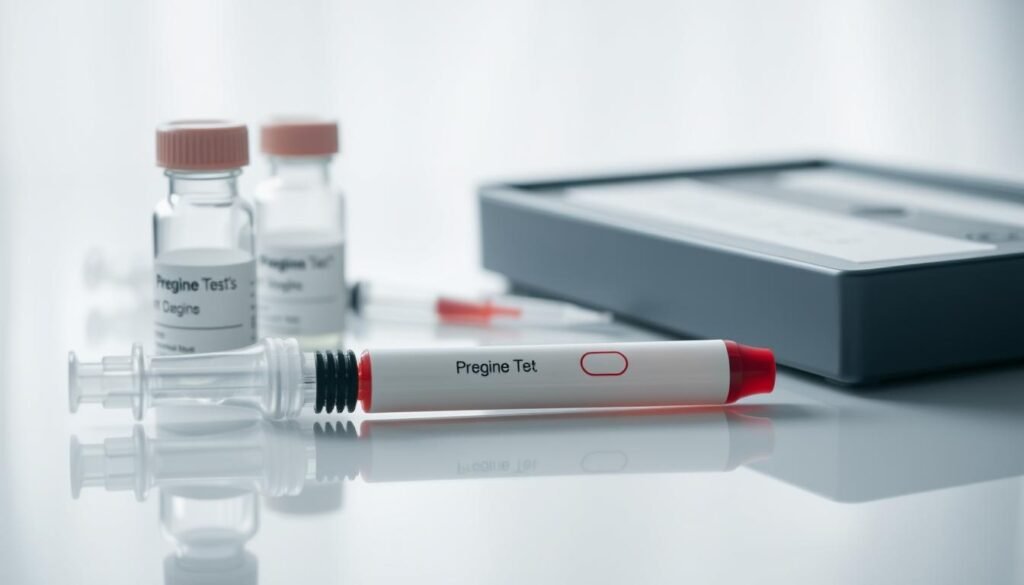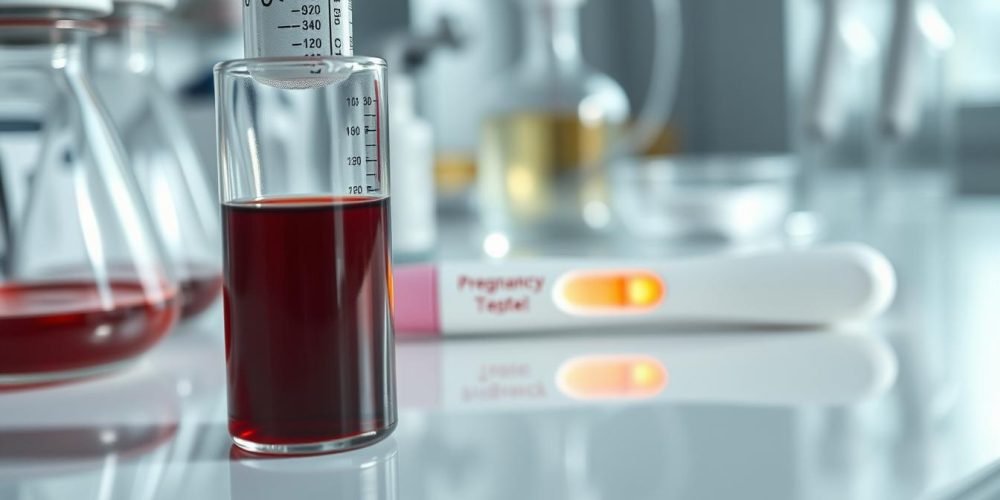How Early Can a Blood Test Detect Pregnancy ? Find Out It’s important for expectant mothers to know when a blood test can find pregnancy. Studies show blood tests can spot pregnancy sooner than home tests. This is because they look for pregnancy hormones, like hCG (human chorionic gonadotropin).
For women trying to get pregnant, knowing when a blood test can detect pregnancy is key. These tests are very good at finding small amounts of hCG. This makes them great for catching pregnancy early. The exact timing depends on the blood test used and how sensitive it is.
Early detection of pregnancy is very important. It lets women get prenatal care sooner, which is vital for a healthy pregnancy. By understanding when a blood test can find pregnancy, women can take steps for a healthy pregnancy and baby. It also helps spot any pregnancy problems early.
Key Takeaways
- Blood tests can detect pregnancy earlier than home pregnancy tests
- hCG levels are crucial for early pregnancy detection
- Understanding how early a blood test can detect pregnancy is essential for expectant mothers
- Early pregnancy detection allows for early prenatal care
- Blood tests are highly sensitive and can detect slight increases in hCG levels
- Early pregnancy detection is critical for a healthy pregnancy and identifying potential complications
Understanding Pregnancy Blood Tests
Pregnancy blood tests are key for finding out if you’re pregnant. They look for human chorionic gonadotropin (hCG) in your blood. This hormone comes from the placenta and helps the embryo grow.
There are types of pregnancy tests like qualitative and quantitative ones. Qualitative tests just say if hCG is there or not. Quantitative tests show how much hCG is in your blood. hCG detection is important because it shows how far along you are in your pregnancy.
Some important things about pregnancy blood tests are:
- Detect hCG levels in the blood
- Can be qualitative or quantitative
- Help determine the progression of pregnancy
When it comes to types of pregnancy tests, each has its own good and bad points. For instance, quantitative tests give more detailed hCG info but cost more. Qualitative tests are cheaper but don’t give as much detail.
In summary, pregnancy blood tests are very important for finding out if you’re pregnant and how your embryo is doing. Knowing about the different types of pregnancy tests helps you make smart choices about your health.
| Type of Test | Description |
|---|---|
| Qualitative | Detects the presence or absence of hCG |
| Quantitative | Measures the exact levels of hCG in the blood |
The Science Behind Early Pregnancy Detection
How Early Can a Blood Test Detect Pregnancy ? Early pregnancy detection is a complex process. It involves understanding hCG levels and how they rise early on. The human chorionic gonadotropin (hCG) hormone is made by the placenta soon after implantation. Its levels can be found in the blood as early as 6-8 days after ovulation.
This knowledge is key in pregnancy science. It helps healthcare providers detect pregnancy early and track the fetus’s growth.
The accuracy of early pregnancy detection depends on several factors. These include the test’s sensitivity and when the test is taken. Early pregnancy detection relies on the quick rise in hCG levels. Blood tests can spot these changes, making them a reliable way to detect pregnancy.
Several factors can affect the accuracy of early pregnancy detection. These include:
- Timing of the test: The earlier the test, the lower the hCG levels might be. This can make the results less accurate.
- Sensitivity of the test: Different tests can detect hCG levels at different sensitivities. This affects their accuracy.
- Individual factors: Certain health conditions or medications can change hCG levels. This can also impact test results.
Understanding hCG levels and pregnancy science helps healthcare providers use blood tests. These tests can detect pregnancy early. This is crucial for the health and well-being of both the mother and the fetus.
How Early Can a Blood Test Detect Pregnancy : Complete Timeline
How Early Can a Blood Test Detect Pregnancy ? Blood tests can detect pregnancy as early as 6-8 days after ovulation. This makes them a good choice for those trying to find out if they are pregnant early. Knowing the blood test detection timeline is key for those trying to conceive or confirm a pregnancy.
Detection Windows for Different Test Types
There are various blood tests, each with its own detection window. The pregnancy test sensitivity is a big factor in how early a test can spot pregnancy. Here are some common blood tests and when they can detect pregnancy:
- Quantitative blood tests: 6-8 days post-ovulation
- Qualitative blood tests: 8-10 days post-ovulation
Comparing Blood Test Sensitivity Levels
It’s important to compare the sensitivity of different blood tests for early pregnancy detection. Sensitivity shows how well a test can find small amounts of the pregnancy hormone, hCG. A more sensitive test can find pregnancy sooner, which is great for those trying to conceive or confirm a pregnancy.
Understanding the blood test detection timeline and pregnancy test sensitivity helps people choose the right test. This can increase their chances of finding out they are pregnant early.
| Test Type | Detection Window | Sensitivity Level |
|---|---|---|
| Quantitative blood test | 6-8 days post-ovulation | High |
| Qualitative blood test | 8-10 days post-ovulation | Medium |
Qualitative vs Quantitative Pregnancy Blood Tests
How Early Can a Blood Test Detect Pregnancy ? Pregnancy blood tests come in two types: qualitative and quantitative. It’s important to know the difference when choosing a pregnancy test. Qualitative tests check for human chorionic gonadotropin (hCG). Quantitative tests measure the hCG levels in your blood.
The main difference is their purpose. Qualitative tests confirm pregnancy with a simple yes or no. Quantitative tests track pregnancy progress and spot early issues.
Understanding hCG Levels
How Early Can a Blood Test Detect Pregnancy ? hCG levels are key in pregnancy tests. They show how well the pregnancy is going. Doctors use hCG levels to find problems like ectopic pregnancy or miscarriage.
Which Test Is Right for You
Think about what you need when choosing a pregnancy test. If you just want to know if you’re pregnant, a qualitative test might be enough. But if you’re tracking your pregnancy, you need a quantitative test. Talk to your doctor to find out what’s best for you.
Benefits of Blood Tests for Pregnancy Detection
How Early Can a Blood Test Detect Pregnancy ? Blood tests have many benefits for finding out if you’re pregnant. They can spot pregnancy hormones sooner than home tests. This means you can know you’re pregnant earlier.
Some key benefits of blood tests are:
- Earlier detection: Blood tests can find pregnancy hormones as early as 6-8 days after ovulation.
- Higher accuracy: Blood tests are more precise than home tests, especially when you’re first pregnant.
- Opportunity for earlier prenatal care: Knowing you’re pregnant early lets you start prenatal care sooner. This can improve health for both mom and baby.
The benefits of blood tests make them a great choice for finding out if you’re pregnant. They’re especially good for women trying to get pregnant or at risk for pregnancy problems. By using a blood test, you can confirm pregnancy early and start prenatal care sooner. This can lead to better health for you and your baby.
| Test Type | Detection Time | Accuracy |
|---|---|---|
| Blood Test | 6-8 days after ovulation | 99% |
| Home Pregnancy Test | 10-14 days after ovulation | 95% |
Comparing Blood Tests to Home Pregnancy Tests
How Early Can a Blood Test Detect Pregnancy ? There are two main ways to find out if you’re pregnant: blood tests and home pregnancy tests. Both can give you accurate results. But, they differ in accuracy, cost, and how easy they are to use.
Accuracy Rates
Blood tests are more precise than home tests. They can spot lower levels of hCG, a hormone that shows pregnancy. This is great for women trying to get pregnant and want to know early.
Cost Considerations
Home tests are cheaper, costing between $5 and $20. Blood tests, however, can range from $50 to $200. This depends on the test type and where you get it.

Convenience Factors
Home tests are easy to use at home. Blood tests need a visit to a doctor or lab. This can be a hassle and take up time.
In summary, blood tests are more accurate but cost more and are less convenient. Home tests are cheaper and easier to use but might not be as accurate. Your choice depends on what matters most to you.
When to Get a Pregnancy Blood Test
Deciding when to get a pregnancy test is key to confirming a pregnancy. The timing of blood tests is crucial for accurate results. You can get blood tests as early as 6-8 days after ovulation, making them a good choice for early detection.
When deciding when to get a pregnancy test, consider these factors:
- Timing of sexual intercourse: Wait until after your expected period if you’ve had unprotected sex.
- Menstrual cycle irregularities: Irregular periods can make it harder to know when to take a test.
- Symptoms of early pregnancy: Morning sickness, fatigue, or breast tenderness might prompt you to test sooner.
Talk to your healthcare provider to find the best time for a pregnancy blood test. They can guide you based on your situation, ensuring accurate results.
By thinking about these points and talking to your healthcare provider, you can choose the right time for a pregnancy test. This way, you’ll get the most accurate results.
| Days Post-Ovulation | Pregnancy Test Accuracy |
|---|---|
| 6-8 days | Highly accurate |
| 9-12 days | Very accurate |
| 13+ days | Mostly accurate |
Factors Affecting Blood Test Results
Several factors can change the results of blood tests for pregnancy. It’s important to know these factors to get reliable results. These factors include medical conditions, medications, and when the test is taken.
Medical conditions like PCOS or ovarian cysts can change hormone levels. This includes hCG, the hormone pregnancy tests look for. Some medicines, like fertility drugs or those with hCG, can also affect results. The time of the test is key because hCG levels can change during the day and might not show up right away.
Medical Conditions and Medications
Some medical conditions and medicines can change hCG levels. This can lead to false positives or negatives. For example, some infertility treatments can raise hCG levels, while others used for ectopic pregnancies can lower them.
Timing Considerations
The time you take the test is very important. hCG levels can go up and down during the day. It’s crucial to follow your healthcare provider’s instructions and take the test at the right time for accurate results.
Knowing what can affect test results helps make sure your results are trustworthy. This means telling your healthcare provider about any medical conditions or medicines you’re taking. Also, following the recommended testing schedule is key.
Even though these factors can impact results, it doesn’t mean the test is wrong. Working closely with your healthcare provider and following their testing advice can help get accurate results.
| Factor | Description |
|---|---|
| Medical Conditions | PCOS, ovarian cysts, and other conditions that affect hormone levels |
| Medications | Fertility drugs, medications that contain hCG, and other medications that can impact test results |
| Timing Considerations | Timing of the test, hCG levels, and implantation |
Interpreting Your Blood Test Results
When interpreting blood test results, it’s key to know the parts, like hCG levels. Human chorionic gonadotropin (hCG) is a hormone made during pregnancy. It shows how the pregnancy is doing.
To get what your blood test means, you need to know what to look for. Here are some important things to remember:
- hCG levels: These levels show if you’re pregnant and how it’s going.
- Reference range: This range shows what hCG levels are normal for pregnant women.
- Abnormal results: If your hCG levels are not in the normal range, it might mean there’s a problem with the pregnancy.
A table showing the normal hCG levels is below:
| Week of Pregnancy | hCG Level (mIU/mL) |
|---|---|
| 1-2 weeks | 10-50 |
| 2-3 weeks | 50-100 |
| 3-4 weeks | 100-500 |
It’s vital to understand your blood test results. This helps you interpret blood test results and make smart choices about your pregnancy. By knowing what to look for and understanding hCG levels, you can work with your healthcare provider to have a healthy pregnancy.
Common Misconceptions About Pregnancy Blood Tests
Pregnancy blood tests are often misunderstood, causing worry for expectant mothers. It’s important to know the truth about these tests. Many think blood tests are painful and invasive, but this isn’t always true.
There are many myths about blood tests, like they’re not as good as home tests. But, science shows blood tests can find pregnancy sooner and more accurately. It’s key to clear up these misconceptions and share the facts to ease worries.
Myths vs Facts
- Myth: Blood tests are only necessary for high-risk pregnancies.
- Fact: Blood tests are good for all pregnancies, to confirm and check on the baby’s growth.
- Myth: Blood tests are always 100% accurate.
- Fact: Blood tests are very accurate, but there’s a small chance of errors, especially if done too early or late.
Scientific Evidence
Research proves pregnancy blood tests can spot pregnancy as early as 6-8 days post-ovulation, with over 99% accuracy. It’s vital to talk to a healthcare provider to find the best test and clear up any doubts about blood tests.
| Test Type | Accuracy Rate | Detection Time |
|---|---|---|
| Qualitative Blood Test | 99% | 6-8 days after ovulation |
| Quantitative Blood Test | 99.5% | 6-8 days after ovulation |
Preparing for a Pregnancy Blood Test
When preparing for a blood test, knowing what to do is key. You need to follow dietary rules, stay hydrated, and know what happens during the test. Getting your test results right depends a lot on how well you prepare.
Here are some tips to help you:
- Drink lots of water before the test
- Don’t eat big meals or drink caffeine before
- Tell your doctor about any meds or supplements you take
Getting ready for a blood test is very important. By following these easy steps, you can make sure your test goes well. This means you’ll get accurate results, which is great for your health.
Being well-prepared means you’re more likely to get good results. This makes the whole process less stressful and more helpful for you.
| Test Preparation Tips | Importance |
|---|---|
| Stay hydrated | High |
| Avoid heavy meals | Medium |
| Inform healthcare provider about medications | High |
What to Expect During the Test
Getting a pregnancy blood test is simple. First, you’ll have a blood draw. This usually happens at a doctor’s office or lab.
Here’s what happens next: you prepare for the test, then the blood draw happens. After that, you wait for the results. Make sure to follow your doctor’s instructions for the best results. You’ll get your results in a day or two.

After getting your results, your doctor will talk them over with you. They’ll explain what they mean and what to do next. Don’t hesitate to ask questions if you’re unsure about anything.
Post-Test Information
When you get your results, your doctor will tell you what they mean. They might suggest more tests or check-ups. It’s important to do what they say to keep your pregnancy healthy.
| Test Result | What it Means | Next Steps |
|---|---|---|
| Positive | You are pregnant | Schedule a follow-up appointment with your healthcare provider |
| Negative | You are not pregnant | Discuss further testing or options with your healthcare provider |
Blood Test Accuracy Rates
Blood tests are very accurate when done right. The blood test accuracy is key to their trustworthiness. The accuracy rates of these tests help find pregnancy hormones in the blood.
Many things can change how accurate blood tests are. This includes when you take the test, the test type, and the healthcare provider’s skill. But, when done correctly, blood tests give very reliable results. This makes them a trusted way to check for pregnancy.
Some important things that can affect blood test accuracy include:
- Timing of the test: The test should be taken at the right time to ensure accurate results.
- Type of test: Different types of blood tests have varying levels of sensitivity and accuracy.
- Skill of the healthcare provider: The skill and experience of the healthcare provider can impact the accuracy of the test results.
In summary, blood test accuracy and accuracy rates are very important for finding out if you’re pregnant. Knowing what affects these rates helps people make better health choices. They can trust the results of their blood tests more.
Follow-Up Steps After Your Blood Test
Getting the results of a pregnancy blood test can change your life. After you get your results, it’s key to take the right follow-up steps for a healthy pregnancy. The next steps after the test will vary based on your results and situation.
Understanding Next Steps
In some cases, you might need follow-up tests to confirm the pregnancy or check how it’s doing. Your healthcare provider will tell you what to do next. This could include ultrasounds, prenatal visits, or other tests.
When to Consult Your Healthcare Provider
If you’re worried or have questions after your test results, talk to your healthcare provider. They’ll give you advice tailored to you. You should seek immediate help if you have unusual symptoms, concerns about the pregnancy, or questions about prenatal care.
By taking the right next steps after the test, you can have a healthy and successful pregnancy. Always talk to your healthcare provider if you have any questions or concerns.
Conclusion
Pregnancy blood tests are a reliable and early way to detect pregnancy. They measure human chorionic gonadotropin (hCG) levels. This can show a pregnancy as early as 8-10 days after conception.
Choosing a blood test has many benefits. It’s more accurate and lets you track hCG levels. You can even find out before you miss your period. Whether you pick a qualitative or quantitative test, it helps you move forward with confidence.
If you think you might be pregnant, talk to your healthcare provider about a blood test. This precise test is the first step towards a new chapter in your life.




